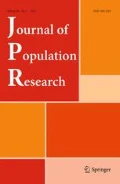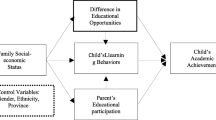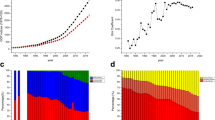Abstract
Family is a fundamental determinant of children’s welfare outcomes, not only in terms of good or bad behaviour, but also in terms of child development, comprising emotional, social, and cognitive skills. Family structure is even more important in a developing country in which educational achievement tends to lag. Using a national sampling from the Program for International Student Assessment (PISA) conducted in 2009 and 2012 in Thailand as a case study for a developing country, this paper quantifies impacts the effects of family structure on cognitive skills and learning performance among Thai students. The findings reveal that family structure, especially for those living with both father and mother, can positively affect the academic achievement of Thai students compared to those who do not live with both parents. Thus, strengthening family structures should be another necessary policy to could promote positive educational outcomes in this developing country.



Similar content being viewed by others
Notes
Ordinary National Educational Test (O-NET) is a test of basic education divided into six subject areas: Thai language, mathematics, sciences, social studies, religion and culture, and foreign languages (English). The test consists of writing and multiple-choice sections.
PISA was first conducted in 2000 and is conducted every 3 years. The latest assessment was in the year 2015, which is the sixth round of the assessments. The program involves students in 70 countries, 34 of which are members of the OECD and the rest non-member countries, including Thailand.
For the first stage, samples of 15-year-old students, who were studying at Grade 7 or higher, in schools all over Thailand, were randomly chosen. In the second stage, 15-year-old students in schools located in each region were randomly chosen to ensure that the data represented students all over the country and that the chances of being selected were equal for all students.
The reason for using data from these 2 years is that the previous surveys from previous years (2000, 2003, and 2006) do not contain a question on family structure of a student. Besides, data on assessment results of the year 2015 had not yet been released at the time of this writing.
PISA score in all the three areas, in this study, refers to plausible value as there are multiple sets of tests involved and each set does not equally assess competency in the three areas, making it improper to compare scores of each student. In response to this issue, the test scores were transformed into five probability values called “plausible values,” of which the average value was used for comparing students’ scores.
Supported by van de Werfhorst and Mijs (2010), who reviewed the comparative literature on the impact of national-level educational institutions on inequality in student achievement. Two types of institutions that characterize the educational system of a country were examined, namely, the system of school-type differentiation (between-school tracking) and the level of standardization (e.g., with regard to central examinations and school autonomy). He finds inequality in terms of dispersion of student test scores and inequality of opportunity by social background and race/ethnicity of students.
Due to missing data on family structure (living with parents), the number of observations decreases from 11,690 to 6343 observations. This missing data may reduce the representativeness of the sample and can therefore distort inferences about the population. Nevertheless, the remaining 6343 observations are still enough to ensure unbiased estimation.
A study conducted by Ghazarian and Buehler (2010) found that American children living with parents who argue excessively tend to have significantly lower educational achievement than children living with parents who do not argue excessively. However, nontraditional families that provide an environment that supports cognitive development can help children achieve their educational goals better than children living in traditional families that do not foster such an environment.
References
Amato, P. R. (2005). The impact of family formation change on the cognitive, social, and emotional well-being of the next generation. The Future of Children, 15(2), 75–96.
Amato, P. R., Patterson, S., & Beattie, B. (2015). Single-parent households and children’s education achievement: A state level analysis. Social Science Research, 25(September), 191–202.
Chilton, R., & Markle, G. (1972). Family disruption, delinquent conduct and the effect of subclassification. American Sociological Review, 37(1), 93–99.
De Loenzien, M. (2016). Lone motherhood and its educational outcomes for children in Vietnam. Marriage & Family Review, 52(1–2), 162–195.
Fasih, T. (2008). Linking education policy to labor market outcomes. The World Bank: Washington D.C.
Ghazarian, S. R., & Buehler, C. (2010). Interparental conflict and academic achievement: An examination of mediating and moderating factors. Journal of Youth and Adolescence, 39(1), 23–35.
Ginther, D., & Pollak, R. (2004). Family structure and children’s educational outcomes: Blended families, stylized facts, and descriptive regressions. Demography, 41(4), 671–696.
Greenwood, J., Guner, N., Kocharkov, G., & Santos, C. (2014). Marry your like: Assortative mating and income inequality. NBER Working Paper No. 19829, Cambridge, MA: National Bureau of Economic Research.
Ham, B. (2004). The effects of divorce and remarriage on the academic achievement of high school seniors. Journal of Divorce & Remarriage, 42(1–2), 159–178.
Hampden-Thompson, G. (2013). Family policy, family structure, and children’s educational achievement. Social Science Research, 42(3), 804–817.
Heckman, J. J. (2008). Role of income and family influence on child outcomes. Annals of the New York Academy of Sciences, 1136, 307–323.
Lutz, W., & Samir, K. C. (2011). Global human capital: Integrating education and population. Science, 333(6042), 587–592.
Miller, P. (1997). Family structure, personality, drinking, smoking and illicit drug use: A study of UK teenagers. Drug and Alcohol Dependence, 45(1–2), 121–129.
Moore, M. R., & Chase-Lansdale, P. L. (2001). Sexual intercourse and pregnancy among African American girls in high-poverty neighborhoods: The role of family and perceived community environment. Journal of Marriage and Family, 63(4), 1146–1157.
Myers, D., Milne, A., Baker, K., & Ginsburg, A. (1987). Student discipline and high school performance. Sociology of Education, 60(1), 18–33.
Organisation for Economic Co-operation and Development (OECD). (2009). PISA data analysis manual: SPSS (2nd ed.). Retrieved May 1, 2014 from http://www.oecd.org/pisa/home.
Painter, G., & Levine, D. (2000). Family structure and youths’ outcomes: Which correlations are causal? The Journal of Human Resources, 35(3), 524–549.
Park, H. (2008). Effects of single parenthood on educational aspiration and student disengagement in Korea. Demographic Research, 18, 377–408.
Pholphirul, P. (2016). Pre-primary education and long-term education performance: Evidence from programme for international student assessment (PISA) Thailand. Journal of Early Childhood Research. https://doi.org/10.1177/1476718X1561683.
Pong, S. (1998). The school compositional effect of single parenthood on 10th-grade achievement. Sociology of Education, 71(1), 23–42.
Pong, S., Dronkers, J., & Hampden-Thompson, G. (2003). Family policies and children’s school achievement in single-versus two-parent families. Journal of Marriage and Family, 65(3), 681–699.
Ram, B., & Hou, F. (2003). Changes in family structure and child outcomes: Roles of economic and familial resources. The Policy Studies Journal, 31(3), 309–330.
Rodgers, B., & Pryor, J. (1998). Divorce and separation: The outcomes for children. New York: Joseph Rowntree Foundation.
Sandefur, G. D., McLanahan, S., & Wojtkiewicz, R. A. (1992). The effects of parental marital status during adolescence on high school graduation. Social Forces, 71(1), 103–121.
Torche, F. (2010). Economic Crisis and Inequality of Educational Opportunity in Latin America. Sociology of Education, 83(2), 85–110.
United Nations Development Program. (2014). Advancing human development through the ASEAN community, Thailand Development Report 2014. Bangkok: United National Development Program.
Van de Werfhorst, H. G., & Mijs, J. J. (2010). Achievement inequality and the institutional structure of educational systems: A comparative perspective. Annual Review of Sociology, 36, 407–428.
Woessmann, L. (2015). An international look at the single-parent: Family structure matters more for U.S. students. Education Next, 15(2), 42–49.
World Bank. (2012). Leading with ideas: Skills for growth and equity in Thailand. Bangkok: The World Bank.
World Bank. (2015). Thailand–wanted: A quality education for all. Bangkok: The World Bank.
Author information
Authors and Affiliations
Corresponding author
Rights and permissions
About this article
Cite this article
Pholphirul, P., Teimtad, S. Living with parents and educational outcomes in developing countries: empirical evidence from PISA Thailand. J Pop Research 35, 87–105 (2018). https://doi.org/10.1007/s12546-017-9196-1
Published:
Issue Date:
DOI: https://doi.org/10.1007/s12546-017-9196-1




